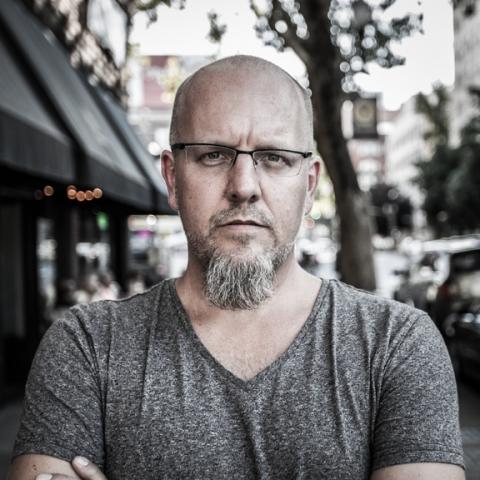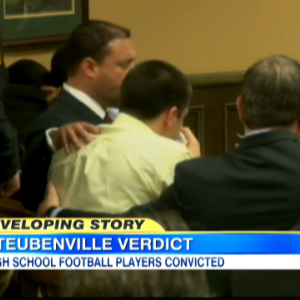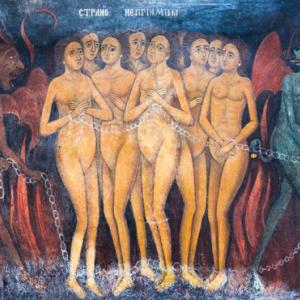
Christian Piatt is an author, blogger at Patheos and founder/cohost of the Homebrewed CultureCast podcast, where he focuses on the intersection of faith and popular culture. His latest book, “Leaving A-holiness Behind,” is available now, and his next book, “Surviving the Bible: A Devotional for the Church Year 2018,” will be available November 1, 2017.
Posts By This Author
Faith or Insanity? Homebrewed CultureCast with Psychologist Stephen Simpson
This week on the Homebrewed CultureCast, we welcomed Stephen Simpson, one of the heads of Psychology at Fuller Theological Seminary, to the show to discuss the intersection of faith and psychology. Specifically, we wanted to try and figure out with him where the thin line between religious fanaticism and pathological mental illness was. Hey, there it is!!!
Five Questions From the Steubenville Rape Case
(Note: This post contains some frank and graphic discussions of sex and sexuality.)
Two boys from a Steubenville Ohio high school (I’ve opted not to use their names, though they are readily publicized by other media) have been sentenced to time in a juvenile detention center for the rape of a 16-year-old classmate who was reportedly so drunk at a party that she could no longer stand on her own. Aside from “digitally” raping the girl with their hands, reportedly multiple times, one of the boys took photos of the girl without her clothes, shared them via social media, and both young men bragged about the incident to their social networks following the incident.
As the father of both a boy and a girl, I was particularly angered and disturbed by this story. The very fact that such things happen in a supposedly civil society is a stark reminder that we have only a tenuous hold on the well-being of our kids once they leave our sight. We can only hope and pray that we’ve empowered them with the sense of autonomy, respect, compassion, and restraint to keep them either from becoming victims of such violations, or perhaps even perpetrators of it themselves.
But once I get beyond my initial feelings about the whole situation, I’m left wrestling with a number of questions that still feel terribly unresolved.
Pope Francis Calls Out the Church
Only a day into his papacy, and I’ve got to admit, Pope Francis has my attention. In an editorial piece on the Sojourners website today, Jim Wallis cited a surprising and very heartening quote from the new pontiff, especially for those looking in from the outside as non-Catholics. Here’s an excerpt from one of his first public addresses:
“We have to avoid the spiritual sickness of a self-referential church. It’s true that when you get out into the street, as happens to every man and woman, there can be accidents. However, if the church remains closed in on itself, self-referential, it gets old. Between a church that suffers accidents in the street, and a church that’s sick because it’s self-referential, I have no doubts about preferring the former.”
Into the Shadows: The Origins of Hell and Satan (Part 2 of 2)
Yesterday, I discussed some of the historical bases for our contemporary understanding of Satan. Today, I’ll consider how hell evolved as part of the Christian faith.
In Old Testament scripture, the resting place for the dead is called Sheol. While some believe this is the same as hell, there are indications to the contrary. In the ancient Jewish tradition, Sheol is a place of rest for both righteous and wicked, with no distinction.
Not everyone is happy about it either.
In the third chapter of Malachi, the prophet recognizes the consternation of faithful Jews who are frustrated that the wicked share the same fate. In Ecclesiastes, the priest Koheleth claims that serving God is vanity. For him, the fact that the righteous are treated the same as the wicked and vice-versa should be a call to eat, drink and be merry.
With respect to any relationship between Satan in the Old Testament and Sheol, there is none.
Satan and Hell: A Brief History (Part 1 of 2)
(I was invited to take part in a debate about hell at a university recently, but unfortunately, the dates don’t work with my schedule this time. But since it’s an interesting topic, and one about which many folks have questions, I thought I’d share a couple of short essays I’ve written on the subject.)
While Jonathan Edwards wasn’t the first to preach about hell and condemnation, his ‘Sinners in the Hands of an Angry God’ sermon in 1741 crystallizes the beginning of a modern movement in the church. Edwards employed fear of punishment as a primary means for conversion and doctrinal adherence. Meanwhile, his congregants fainted in the aisles and clung to the pews to avoid being dragged down into the abyss.
We can argue day and night about whether fear-based theology is effective, biblically accurate, or even necessary. But it’s worthwhile to consider where our contemporary ideas about hell and Satan even come from.
Today, we’ll begin with Satan; we’ll save hell for tomorrow.
Why the Next Pope Should Be a Poor Woman of Color
For the first time in six centuries, the head of the Catholic Church is stepping down. Some, like Huffington Post Religion’s Senior Editor Paul Raushenbush, have suggested this is an indication that the stodgy religious institution is creeping its way toward modernism. Could it be that the role of Pope will be considered to be that more like a CEO than a sovereign ruler? Is there room within today’s church for its leadership to step down when they feel they can no longer adequately fill the tremendous demands heaped upon them?
Can Popes retire? And if so, do they have to give up those cool red shoes?
So if, indeed, the Catholic Church is moving in a new direction, why not consider a more thorough overhaul? Some have suggested that the next Pope should come from the southern hemisphere, given that this is where the faith is growing the most (actually, it’s not really growing much at all in the northern half of the world). But as some have suggested within the church, the process of selecting a Pope is not necessarily driven by creating a representative leadership.
That said, it seems a rare opportunity to do something exciting. I, like many people, assumed that the successor to Pope Benedict would have to come from within the College of Cardinals. But though this has been tradition for most of the life of the Church, Pope Clement V is a rare exception. He was plucked from a monastery to become Pope, with the hope of overcoming much of the perceived corruption within the College.
And though the College of Cardinals is not explicitly mired in scandal at the moment, the Church itself certainly has suffered some blows in the court of public opinion, as well as in the court of law, in some cases. So given that precedent, perhaps it’s time for another radical departure from tradition, one that will signal to the world that the Church is more committed than ever before to its mandate to care for the poor, and support the marginalized.
The Only Way Out is Through (A Lenten Reflection)
A day of darkness and gloom, a day of clouds and thick darkness!
-Joel 2:2
Who in their right mind looks forward to Lent? Seven weeks of preparation to lead up to Good Friday hardly seems like an enjoyable way to spend our time.
Why not work on those New Year’s resolutions that have already been slipping instead? How about some more quality time with the family? What good, after all, can come from dwelling on darkness and death for more than forty days?
How about we all just agree to skip Lent this year and just get back together on Easter, okay?
The Ikea Effect, Slow Church, and Laboring Our Way Into Love
A man buys two dogs to live with him in his apartment. They drive him and his neighbors crazy. They bark at all hours, get sick all over the place and cause rifts between him and his neighbors. And yet he insists that, despite the tremendous amount of work and inconvenience they present, he loves them.
So the question is: does he do all the work and put up with the nonsense because he loves them, or does he love them because he’s invested so much of himself in them?
Researchers looked at this question, particularly with regard to the wild popularity of the DIY furniture store, Ikea. Basically, you pay them to give you some furniture in a box that you have to take home and build. Sometimes you screw it up. Sometimes it takes a lot longer than you expected. Sometimes you scrape the skin off your knuckles and call the furniture names that would make your mother blush. In the end, if most of us assessed the value of our time against the money we’re saving by buying the furniture unassembled, it’s a net loss for us.
So why do we do it?
I'm An A-Hole Dad
Mattias: “Dad, I forgive you.”
Me: “But I didn’t do anything wrong.”
Mattias: “That’s okay. I forgive you anyway.”
— Mattias, 5 years, 1 month
I’m a big, gigantic jerk of a dad.
My son, Mattias, is a charmer. As introverted and crowd-averse as I am, he feeds off the energy of a group. His uncle Matt calls him “Slumdog Millionaire” because he’s convinced that, if you dropped him in the middle of Calcutta with nothing but the clothes on his back, he’d be running the joint inside of six months.
This particular day, Mattias was working on a smaller scale, charming his uncle Joe out of five bucks over a family dinner. The problem is that, about half the time, he loses the money before it makes it into his bank. So I offered to carry it for him while we were out running some errands later on.
He asked for it back after a while, and I explained that if he lost it, there were no refunds. I figured, though, that even losing the money was a lesson worth learning.
Sure enough, that evening at dinner, he dug into his pocket for his cash and found nothing.
Is Gender Equality Killing Women?
I consider myself a feminist, which means (to me at least) I support the elimination of barriers to access for all people, regardless of their gender. But in spite of that, the equality that follows such efforts comes with its own consequences for the culture, and sometimes even for the woman herself.
My wife, Amy, pastors a prominent church in downtown Portland. She has office hours, late-night meetings, and weekend commitments that keep her away from home quite a bit, sometimes more often than she’d prefer. I work most days from home as a writer, which means I have greater flexibility in my schedule to take the kids, pick them up, and sometimes make dinner or even put the little guys to bed. It’s not often that Amy gets home after both kids are asleep, but it happens. And when it does, I see the pain on her face.
Zoe, our four-year-old, had a dad’s night at her preschool this past week, at which they presented us with the requisite finger paintings and other artifacts of her classroom time. But my favorite thing was a letter that she dictated to her teacher for me. The very first sentence in the letter was as follows.
I Hate Loving Mark Driscoll
Rev. Mark Driscoll, founder of Mars Hill church, has a true gift. Just when I think I’m making at least a modicum of progress toward tolerance – if not actual Christlike love – toward the guy, inevitably he does something to make me despise him all over again.
On the Monday, before President Obama’s inauguration ceremony, Driscoll sent out the following message to his more than 300,000 Twitter followers:
Praying for our president, who today will place his hand on a Bible he does not believe to take an oath to a God he likely does not know.
As of Thursday morning, the tweet has received more than 3,400 retweets and nearly 1,350 favorites. Driscoll’s next tweet was about an iPad Mini giveaway.
When Radical Welcome Gets Messy
It’s easier to guide the vision and mission of a church you start. It’s another thing to help a 135-year-old congregation reimagine what it means to be a downtown urban church in a world that has changed dramatically all around it. At Milagro, the church we founded in our living room some nine years ago, we set the course for what we wanted that community to look like: a refuge for the spiritual walking wounded, safe haven for questions, doubt, and a culture of mutual encouragement, support, and accountability that would allow people to explore their own relationship with the Divine. We have since set that community free and already, it is becoming something different.
As well it should.
Now we find ourselves at First Christian Church in downtown Portland — a different animal entirely. In some ways, the two communities are very complementary, in that one has what the other tends to lack. But we’ve discerned that, first and foremost, our job is to help cultivate a spirit of radical openness and welcome. But what does this mean, and how do we even begin to change the makeup of an institution that has exited for more than five generations before us?
Sometimes, it’s the simplest things that say the most. We had a tradition at Milagro of “mugging” people when they came for the first time. This meant one of our hospitality stewards (AKA, “muggers”) would approach them and give them a coffee mug filled with candy and some information about the church. With First Christian, however, most people know we’re here; the bigger question lingering in the public mind is why.
In this case, instead of a brochure describing programs or institutional history, Amy included the welcome statement that follows, which she borrowed and adapted from a Catholic community.
A Down Economy’s Silver Lining for Men
I was a nervous kid. Once, I got so freaked out by the prospect of a speaking part in my first-grade school play that my folks thought I had come down with appendicitis. But there were two times in particular that I remember descending into unmitigated panic. Both involved discussions with my dad about my career.
The first time, my dad was telling me about his year-by-year earning trends as an insurance salesman. He went from being one of several agents manning a booth in a Sears store to being the highest-earning employee in his major international company over about 15 years. He added zeroes to his income, and a passel of staffers, including my mom for a while (didn’t work out so well – they divorced thereafter).
At his height, he was earning upwards of half a million a year, and this was in the 80s. His company flew him all over the world, showered him with awards, and held him up as the high-water mark for all other agents to aspire to. I combined this remarkable achievement with the implicit cultural message that all generations exceeded their parents in earning power and went into an emotional tailspin.
How in the hell was I going to make that kind of money?
Finding God in Jane’s Addiction’s Perry Farrell?
I know this sounds totally bizarre, but I had a moment of clarity about the value of human life in, of all places, a kid-themed pizza joint yesterday. No, they don’t exploit their workers (that I know of, short of submitting them to overstimulated kids all day). It took a few steps for me to get there, so bear with me.
Yesterday, my daughter, Zoe, turned four years old. It’s a crappy time of year to have a birthday party, since lots of people are out of town, and those who are around are more or less partied out from the holidays. On top of that, we just moved here a few months ago and hardly know anyone. So to try and make up for all of that, we let her pick anywhere she wanted to go for dinner.
Not surprisingly, she picked John’s Incredible Pizza Company, which is like Chuck E. Cheese on steroids. Not high on my list of choices, but hey, it wasn’t my birthday. Zoe’s grandparents are in town and they invited a couple other family members who live nearby to join us. One of Amy’s distant cousins brought along her husband or boyfriend (still not sure which), and I remarked after the dinner to amy that he bore a striking resemblance to the alt-rock front man Perry Ferrell, of Jane’s Addiction fame.
“What ever happened to Perry?” Amy asked. Short of founding the Lollapalooza Festival and hitting every Coachella festival ever held, I had nothing. So I Googled him.
Church Sign Epic Fails, 'Crush China for Jesus' Edition
When Chinese kids won’t eat their Cheerios, do their parents tell them there are starving kids in America to convince them to finish?

The good news is, we didn’t take their advice; instead, we sold ourselves to China! ***Footnote: I have since been educated on the context of this sign, which makes it understandable. The sign actually suggested that crushing China was a bad thing. Why does history have to go and ruin my fun??? Stupid history!!!
Ten Defining Phrases of 2012
Generally, we only know how history will be remembered once it is in the rearview mirror. Something, or some things, jump out and remain indelible in the collective memories of the culture. And in a world defined by sound bytes, sometimes only a few words tell us a lot about that moment in time.
In that spirit, here are my selections for the ten most defining phrases that will stay with us from the past year.
Homebrewed CultureCast with 'The Shack' author, Wm. Paul Young
This week’s episode was recorded in the youth group room at First Christian Church in downtown Portland, Ore. To start things off, Jordan talks about being the Marv Marinovich of comedy by relentlessly pushing his daughter to be funnier while Christian embraces the black magic that is naturopathic medicine.
This week’s guest is Wm. Paul Young, author of the wildly popular novel The Shack, which has sold 18 million copies to date. Paul talks about the creative process, about trusting God rather than trying to please, and the development of his latest book, Crossroads. Basically, it’s just an interesting conversation with a fascinating person who’s also incredibly gracious and humble.
Pastor Terry Jones is No Match for the Beatles’ LOVE
Many will remember pastor Terry Jones as the champion of the “Burn a Quran Day” event, intended to fan anti-Islamic rhetoric on the anniversary of the Sept. 11 attacks. Though many shouted him down and criticized his motives, he continues to have somewhat of a national platform for his agenda.
In this video produced by the New York Times, we get to witness what I consider a momentary intervention of God’s spirit in a beautifully, creatively nonviolent way. As Pastor Jones condemns Muslims and their religion, a man in the crowd pulls up the lyrics to the Beatles song, “All You Need is Love” on his phone. He stands next to jones and begins to sing, inviting the crowd to join in. It is beautiful because his hate is repaid with song, and the sting of his venomous words is neutralized without a hand or another voice being raised in anger (though I could do without the “idiot” sign, thanks).
Five Children’s Questions About the Sandy Hook Tragedy
I’ve seen plenty of articles responding to the shooting in Sandy Hook, Connecticut. Some are angry, some pastoral, still others, prophetic in their call for change in various forms. I have little to add to the conversation at that level, but I have heard questions from many children, some from my own kids. I thought I’d offer some responses I’ve shared.
What happened?
Something terribly sad. A man hurt some children and adults in a school in Connecticut. Some of them died. The teachers and students were very brave, and the community is working together to take care of those who survived and those who lost someone they loved. Even the President went there to be with them.
Dear Christians: Relax. There’s No War on Our Faith
I sat behind a couple of folks on a plane to Seattle this morning who were discussing their distress about a so-called war on Christmas.
“Memorial Day is a holiday,” said the man in a santa hat with disgust. “July 4th and Thanksgiving are holidays. Christmas is, well, Christmas!”
“Absolutely,” nodded the woman next to him. “It’s just more evidence of this war against Christmas.”
On the way off the plane, a flight attendant made the grave mistake of wishing the man happy holidays. He stopped the line of outgoing traffic behind him (including me) to correct her. She demurred, looked toward her feet and smiled sheepishly.
We Christians have a long and storied history of playing the martyr, whether there’s actually anyone persecuting us or not.


















